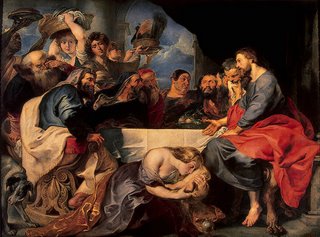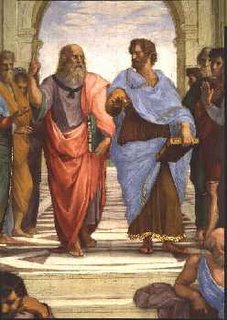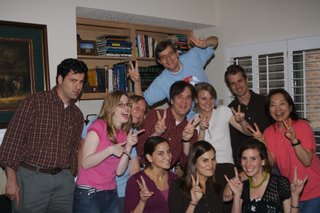
*
Feast in the House of Simon the Pharisee,Between 1618 and 1620
Pieter Paul Rubens
Sometimes I get stuck when I stare at a Scriptural passage for an extended period. I have to write something to get unstuck. It's a bit unorthodox to present the raw materials for what you hope will form the substance of a forthcoming lesson, but I welcome anyone's corrections or clarifications or criticisms. Really, I do. Here's the work-product of how to sum up what Paul is saying in GalatiansFor weeks now we’ve tried to hammer home a major theme of Paul’s letter—namely that not by works shall a man be justified, that is, considered in right-standing before God. Such is the non-negotiable feature of the Gospel. No man can be saved—delivered from the wrath of God for their being a sinner—without the intervention of Christ. His grace, not my works, is what matters and what is able to reconcile me to God.
But what then is the life to which He has called us. If salvation cannot motivate me to be holy—that is, if my holy acts are incapable to warrant my salvation—then what is my motivation for being holy? Paul has demonstrated that mere obedience to the Law without the help of the Spirit only leaves you frustrated and no closer to what the Law really solicits; but the Gospel surely doesn’t intend for us to live as we please. So what then is the purpose of any striving for the life God intends in His adopted children?
How do we find our motivation to act when our actions never had currency with God in terms of our salvation? (That’s not really the question, is it?)
If works are futile for my salvation, then what good are works at all? There’s a point to them, of course—why else would Paul here in chapter 6 insist on sowing to the Spirit—i.e. investing in those things which have eternal significance, instead of to our flesh, the ephemeral? But what is to be the basis of our motivation for performing them?
That in doing them, we understand more deeply what it is to be truly His. To have benefited from His work on an unfathomable scale, but then to remain aloof of the kind of universe He has supplied us, to live without reference to His identity and purposes for us is a huge disconnect. If He has done all this through Christ for us, then for what reasons would we choose not to live unto Him—that is, live under His reign and rule, under His provision and protection, for His purposes and priorities?
Of course we’re to live unto Him, but we’re to live as already-forgiven, already-adopted children. We’re to live trusting those realities, to live out of a sense of those realities. As I’ve said, perhaps numerous times, before: a life confident of God’s favor will act in ways qualitatively different from one for whom there is no such confidence. Both scenarios believe in God. Both acknowledge His holiness and one’s lack thereof. Both know God wills for us to be and do as He is and does (with exceptions, of course, pertaining to our natures). But the latter thinks the gap between God’s and one’s own holiness is the gap that must be closed if there is to be any peace in this life, and that the gap is closed on the basis of what one has done. The latter also believes that the extent to which he/she conforms to the character and purposes of God is what determines whether the approval of God is theirs. Contingency abounds in that in no sense can the love or favor of God be counted upon. Even if His favor doesn’t stand entirely on an individual’s shoulders, to leave any of the responsibility to him is to make the whole deal up for grabs—there’s room for God’s rooting for you and then at some point concluding you didn’t quite pass muster and then consigning you to the outer darkness. Any time you include even the slightest part of you in the equation of whether His favor shall come and be sustained upon you, you make that favor always at risk of revoked (I use the word revoked—i.e. having once had something and then had it taken away--since any progress toward God—any knowledge or pleasure in His will—would imply that some favor, if not full favor, were already in place, otherwise there’d be no progress towards Him).
I’m still trying to reconcile these two statements of Paul, statements driven by theology construed by the same man:
1. For no one shall be justified by works of the Law (2:16)
2. Do not be deceived. God is not mocked, for what one sows, that he shall reap. For he who sows to his own flesh shall reap corruption, but he who sows to the Spirit shall reap eternal life. (6:6,7)
The first statement makes obedience to the Law ineffectual for the righteous requirement of God that justification signifies. My work at obeying the Law will always be insufficient to fulfill what the Law solicits. So obedience to the Law is purposeless, or so it might seem.
The second statement seems to make what it is you do of critical importance to the destiny you will experience. That to which I am sowing—to which my heart, and thus my will, is oriented—has reference to the return I will receive. There remains a causal relationship between what I invest and what I get in return.
So, obedience to the Law is futile, yet obedience to that which is eternal—which certainly the Law encapsulates—is essential. Ugh. Is Paul speaking out of both sides of his mouth? Of course not, but the juxtaposition here is still difficult to untangle. Is lawfulness both futile and essential? That’s a non-sequitur.
Perhaps, something I just read in Gary Thomas’ little book,
Authentic Faith, helps to bring some order to the statements’ ostensible irreconcilability:
[Paul] didn’t improve on his morality after meeting Christ, because Pharisees went out of their way to live blameless lives. Paul didn’t pray more as a Christian, because Pharisees were masters of spiritual discipline. The only real difference in Paul’s life is that he became centered on the freedom of Christ’s provision, which enabled him to love God by serving others instead of being obsessed about his own religious achievements.
Thomas helps me see that the dovetailing of those two statements relies on a matter of focus. Law bids us to love: love God, love neighbor. But complying with the command to love in order to be loved by God is impossible. But despite the fact that my version of loving will never adequately warrant His loving me, I’m still commanded to love. Who loves best? Those who are most confident of that love. It’s not so far from what Jesus had to say to some Pharisees regarding the nature of forgiveness.
Luke 7:36 One of the Pharisees asked him to eat with him, and he went into the Pharisee's house and took his place at the table. 37 And behold, a woman of the city, who was a sinner, when she learned that he was reclining at table in the Pharisee's house, brought an alabaster flask of ointment, 38 and standing behind him at his feet, weeping, she began to wet his feet with her tears and wiped them with the hair of her head and kissed his feet and anointed them with the ointment. 39 Now when the Pharisee who had invited him saw this, he said to himself, "If this man were a prophet, he would have known who and what sort of woman this is who is touching him, for she is a sinner." 40 And Jesus answering said to him, "Simon, I have something to say to you." And he answered, "Say it, Teacher." 41 "A certain moneylender had two debtors. One owed five hundred denarii, and the other fifty. 42 When they could not pay, he cancelled the debt of both. Now which of them will love him more?" 43 Simon answered, "The one, I suppose, for whom he cancelled the larger debt." And he said to him, "You have judged rightly." 44 Then turning toward the woman he said to Simon, "Do you see this woman? I entered your house; you gave me no water for my feet, but she has wet my feet with her tears and wiped them with her hair. 45 You gave me no kiss, but from the time I came in she has not ceased to kiss my feet. 46 You did not anoint my head with oil, but she has anointed my feet with ointment. 47 Therefore I tell you, her sins, which are many, are forgiven-for she loved much. But he who is forgiven little, loves little." 48 And he said to her, "Your sins are forgiven." 49 Then those who were at table with him began to say among* themselves, "Who is this, who even forgives sins?" 50 And he said to the woman, "Your faith has saved you; go in peace."
She was no perfect follower of the Law. She was clearly in flagrant violation of it; on that count, both Pharisees and Jesus were in agreement. But she did recognize how much she’d been forgiven. And what was her response? To love so strenuously (her tears, her adoration exemplifying the condition of her heart), not in order to be loved, but as an expression of that confidence in His love for her may provide us a snapshot of what it means to be both insecure in your ability to merit favor but confident of favor that propels you to showing the kind of character (love) the Law wished, but was unable, to engender. She does not deny her need of forgiveness. She does not conceal her faith in Jesus’ ability to grant it. She does not withhold a drop of adoration for Him. Jesus, in turn, confirms with His words what was already true for her in eternity: she was forgiven. And how had her faith “saved” her? Was her act what sealed the deal? Not exactly, but her act of adoration only confirmed what was true of her heart: to repeat, she had faith in her own bankruptcy (an odd turn of phrase, I know, but still, I think, accurate) and she had faith in His sufficiency, His singular authority.
So you’ve got a lawless woman, committing a lawful act of the highest order (the worship of her redeemer), as a function of having been forgiven of her lawlessness. She knows no act of contrition can “make up” for her lawlessness; so she affirms in principle what Paul claims in Galatians 2:16 (for no flesh shall be justified by works of the Law). But she also knows that living truthfully before God—to acknowledge your bankruptcy and His authority—will manifest in both worship and love of that which has reference to eternal things. She comes to Him looking for wholeness, not a few drachma to tide her over or buy herself liquor; so her heart is oriented toward the things of God and is thus in principle sowing to the Spirit as Paul enjoins in Gal 6:6,7 (but he who sows to the Spirit shall reap eternal life).
To sum up, the love this forgiven woman shows Jesus. . .love which as Jesus explains will overflow to loving, not only to the Messiah, but to whomever. . .knows it will not “earn” her favor, but she also knows that such love is what those who know the living God will do. She represents what a life that knows its inability to meet the Law’s demands, yet manifests the Law’s character as a function of having been forgiven—forgiveness motivated by nothing other than the love of God.









